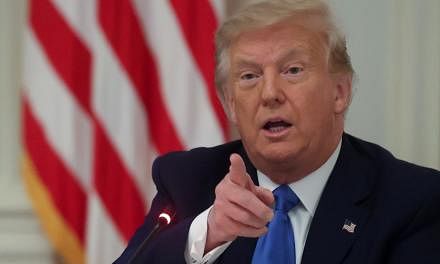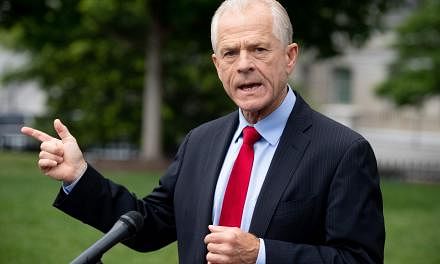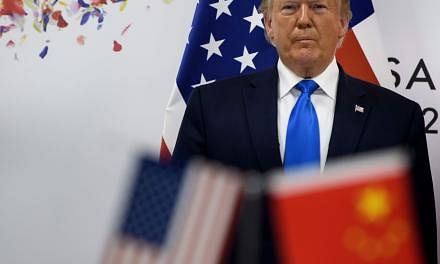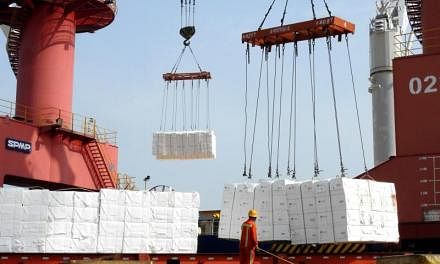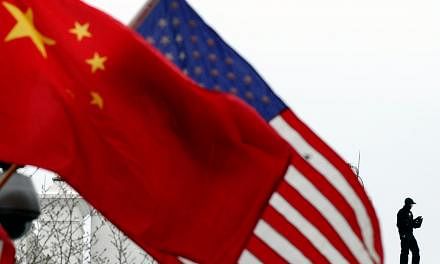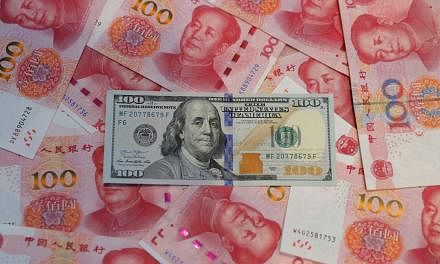The trade war that has been battering the world economy for 16 months deepened yesterday after United States President Donald Trump announced a new set of tariffs on China, while Beijing swiftly vowed to retaliate.
Mr Trump's surprise move, declared in overnight tweets, sent stocks from Asia to Europe into a tailspin and the Chinese yuan plunging to its lowest this year.
In Asia, Japan and Hong Kong tumbled more than 2 per cent, and Taiwan fell 1.7 per cent. Shanghai and Shenzhen each shed more than 1.4 per cent, while the Straits Times Index ended down 0.93 per cent.
The yuan fell to 6.950 to the dollar, but recovered slightly by midday yesterday.
With the trade war escalating, Maybank Kim Eng senior economist Chua Hak Bin predicted that Singapore would slip into a technical recession in the third quarter.
Mr Trump had accused Beijing of not following through on its promise to buy more American agricultural products and stop the sale of the painkiller fentanyl to the US, which he blames for fuelling an opioid crisis.
For that, he is putting a "small additional tariff" of 10 per cent on the remaining US$300 billion (S$413 billion) in Chinese imports, on top of the 25 per cent tariffs already imposed on US$250 billion worth of Chinese goods. This effectively taxes all Chinese imports.
A Chinese Commerce Ministry spokesman promised to hit back, saying in a statement that if the US introduces the new taxes on Sept 1, Beijing will take countermeasures "to resolutely defend the core interests of the country and the fundamental interests of the people".
The statement did not say what these countermeasures would be, but they could come in the form of tariffs, a ban on the export of rare earths or a blacklist of US firms. So far, Beijing has only introduced tit-for-tat tariffs of up to 25 per cent on US$110 billion of American products.
But even the tariffs imposed by the US on the remaining US$300 billion of Chinese imports could hit American consumers hard, said OCBC Bank's head of Greater China Research, Mr Tommy Xie, as 60 per cent of these would be directed at consumer goods such as smartphones and laptops. "The impact on the global economy may mainly be felt via worsening risk-off sentiment," he added.
Mr Trump's announcement came just days after the US and China finished what both sides had described as "constructive" talks in Shanghai that were due to resume next month in Washington.
Talks fell apart in May after the US accused China of walking back on its commitments, while Beijing said Washington kept changing its demands and refused to remove existing tariffs.
While Mr Trump seems set on intensifying pressure on China over the trade talks, observers believe it will have the opposite effect.
Mr Hu Xijin, editor-in-chief of the nationalistic Global Times, tweeted that the new tariffs put the prospect of a trade deal even further from reach. "I think the Chinese will no longer give priority to controlling trade war scale; they will focus on the national strategy under a prolonged trade war," he said.
Mr Nelson Dong, senior partner at international law firm Dorsey and Whitney, said that "pushing the other side into a corner where any meaningful concession then appears to be 'weakness' or 'vulnerability'... typically reduces the likelihood of a positive outcome".
China has toughened its stance of late and prepared its citizens for a "people's war".
Additional reporting by Grace Leong
SEE TOP OF THE NEWS
New tariffs dampen hopes of a trade deal
Importers and suppliers not the only ones bearing burden of levies


